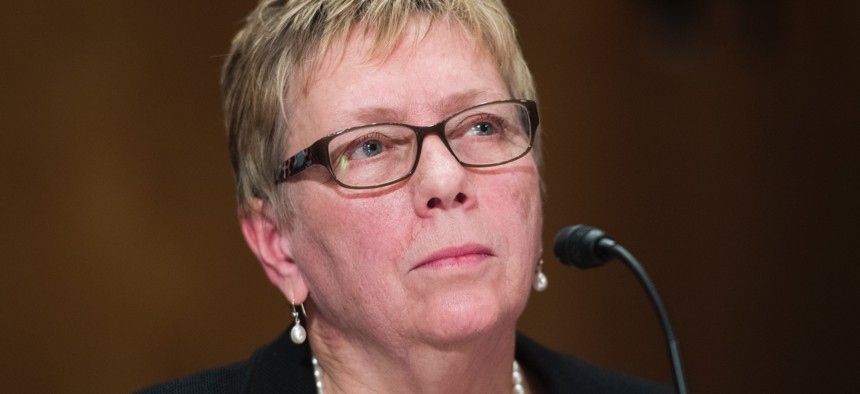
Federal Labor Relations Authority nominee, and former chairwoman, Colleen Duffy Kiko told the Senate Homeland Security and Governmental Affairs Committee that flat-funding at the agency had impacted employee morale. Tom Williams / GETTY IMAGES
Biden’s FLRA nominees move closer to Senate confirmation
Senators appeared poised Wednesday to advance the nominations of aspiring leaders in labor-relations.
President Biden’s picks to fill out an adjudicative body that resolves labor-management disputes at federal agencies sailed through their confirmation hearing Wednesday, receiving little resistance under questioning from senators.
The Senate Homeland Security and Governmental Affairs Committee accepted testimony from Federal Labor Relations Authority nominees Colleen Duffy Kiko and Anne Wagner. Kiko already sits as the FLRA’s sole Republican member; her nomination is for a new five-year term at the agency.
The road toward filling all three of the positions atop the FLRA has been an arduous one. Although the nomination and confirmation of FLRA Chairwoman Susan Tsui Grundmann was routine, former Chairman Ernest DuBester’s renomination was blocked by Senate Republicans, and Biden’s second pick for the seat, Nancy Speight, quietly withdrew from consideration last fall.
Senators asked both Kiko and Wagner, who most recently served as a deputy in the Office of Special Counsel, about the impact of stagnant budgets on the FLRA. Last year, Grundmann warned that if the FLRA’s budget continued to remain flat, the agency would be forced to furlough employees.
“The FLRA has been flat-funded for quite a few years, and we have approximately 80% of our budget devoted to personnel, so when that happens, you have to look at new ways to meet the budgets,” Kiko said. “Generally, it’s difficult. In the past, we’ve had to close some regional offices down, so in an effort to save the people, we got rid of some of the space . . . We’re trying to live within our budget, but it is challenging, not only to get the cases done but to continue to serve our customers.”
In the agreement Congress reached to fund the government for fiscal 2024, the FLRA again received just $29.5 million, which amounts to a decrease from the $29.6 million it received a full two decades ago in fiscal 2004. Wagner said that if confirmed, she would seek to support Grundmann’s quest to end the decades' worth of flat funding.
“I haven’t had the privilege of being at the FLRA and so I don’t have an insider’s view in terms of the particular internal challenges the authority might be facing,” she said. “I think the budget, a flat-line budget, is difficult when an agency is responsible for producing high-quality and efficient adjudication of cases, especially as caseloads continue to go up.”
In the most adversarial line of questioning of the hearing, Committee Chairman Gary Peters, D-Mich., asked Kiko about her tenure as FLRA chairwoman for much of the Trump administration and a corresponding decline in the morale of the agency’s workforce.
“After you became chairwoman of the FLRA in 2017, employee morale dropped significantly,” he said. “Engagement and satisfaction scores in the Federal Employee Viewpoint Survey fell to its lowest levels in a decade in your first two years as chair. How did you respond to the drop in morale, and what changes did you make?”
Kiko said she attributes much of the decline in morale and engagement early in her tenure to the agency’s chronic underfunding, which she said forced her to close two regional offices.
“We had some challenges when I first became chairman—and being the chair, you have to make some very difficult decisions, a lot of which had to do with our flat budgeting,” Kiko said. “[I] spent an awful lot of time identifying what some of the concerns were in the FEVS and attacking them one by one to make sure each concern was addressed. At the same time that the FEVS was coming out, we were building a new strategic plan for the agency, and as such I created teams so that every employee in the agency could be part of building that plan . . . I think as a result of a lot of those efforts, our scores did rise 20 points while I was chair in 2020, and I believe our efforts made a difference in raising those scores.”







